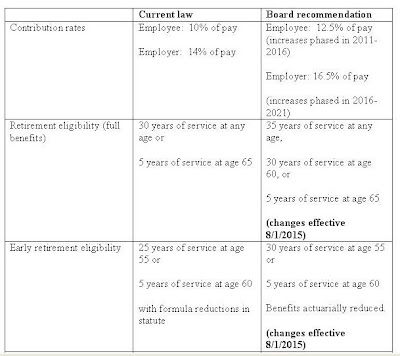Tina and Pat,
Then, why did ALL "your" OEA endorsed STRS Board members vote (a unanimous vote) in favor of this STRS recommendation to the Ohio Retirement Study Council? You didn't inform your membership of this FACT, did you? I'll help you out with this...it is because "they" have a legal fiduciary responsibility to all STRS stakeholders(both active teachers and retirees)...a legal fiduciary responsibility which neither one of you (nor the OEA) has.
John Curry
From: O'Donnell, Tina [OH] [odonnellt@ohea.org] On Behalf Of Frost-Brooks, Pat [OH] [frostbro@ohea.org], September 4, 2009
Subject: OEA Reaction to STRS Board Plan
Recommendations
To: OEA Board of Directors
OEA District Leaders
OEA Local Presidents
OEA-Retired
OEA Staff
From: Patricia Frost-Brooks, President
On Tuesday, September 1, 2009, the STRS Board voted to recommend proposed changes to the pension benefits. These recommendations are a response to the Ohio Retirement Study Council (ORSC) request for a board-approved plan to improve system funding by September 9, 2009. All of Ohio’s five public retirement systems are expected to present a report to the ORSC on that date. It is important to note that any of the proposed changes would require a change in state law. These changes cannot be made by the retirement systems themselves.
OEA does not support the plan adopted by the STRS Board.
Changes of this magnitude, that would have a life-altering effect on hundreds of thousands of active and retired teachers, should not be considered in a rush. The timeline set by ORSC did not allow sufficient time to achieve consensus among stakeholder groups. OEA believes that employees, employers and retirees have a shared responsibility for improving system funding.
A summary of the STRS Board’s recommendations is below:
[Click images to enlarge.]
 OEA believes the board-approved plan places a disproportionate burden on active teachers.
OEA believes the board-approved plan places a disproportionate burden on active teachers.
Under the STRS plan, active teachers would pay more, work longer and receive less in retirement. OEA believes that some of the proposed changes go too far. Under the plan, employees would pay (12.5%) more than the normal cost of a year of service (11.79%)—in essence paying for their entire benefit. Changes in retirement eligibility could be phased in over a longer period of time. We believe employees can be afforded adequate time to plan without compromising system funding. Additionally, a tiered COLA benefit causes material equity issues and will lead to a “rush to the door.”
Beyond the substantial impact on individual members, if enacted, this plan would have unintended consequences for STRS, local school districts and ultimately Ohio’s students. Benefit decreases and contribution increases could lead more new employees to choose the defined contribution plan. Migration out of the traditional pension plan would undermine funding for the system—the very problem the STRS Board is attempting to solve. Increasing the retirement age will increase salary and health care costs for school districts. In addition, teaching is a physically and mentally demanding profession. Increasing the retirement age can lead to burn out among teachers and higher rates of disability. This is not a recipe for improving public schools.
The STRS plan does address a very real problem.
The severe economic downturn has hit all of the retirement systems hard. Prudent changes will need to be made in order to improve system funding and the security of benefits promised to current and future retirees. The STRS Board and staff have wrestled mightily with these complex issues under an unreasonable timeline. Going forward, OEA is committed to continue working with the STRS Board, stakeholders and the legislature to achieve a fair and equitable solution for maintaining the health of the pension system.
Next Steps
OEA will be fully engaged in discussions at the Statehouse that affect our members in STRS, SERS and OPERS. Ensuring the continued viability of our public retirement systems is of utmost importance. However, placing an undue burden on public employees is not the solution. Ultimately, pension reform legislation is something that should be done for our members not to our members. We will continue to keep members updated and provide opportunities to impact the process. Very soon we expect to ask for your grassroots efforts with the legislators.



<< Home